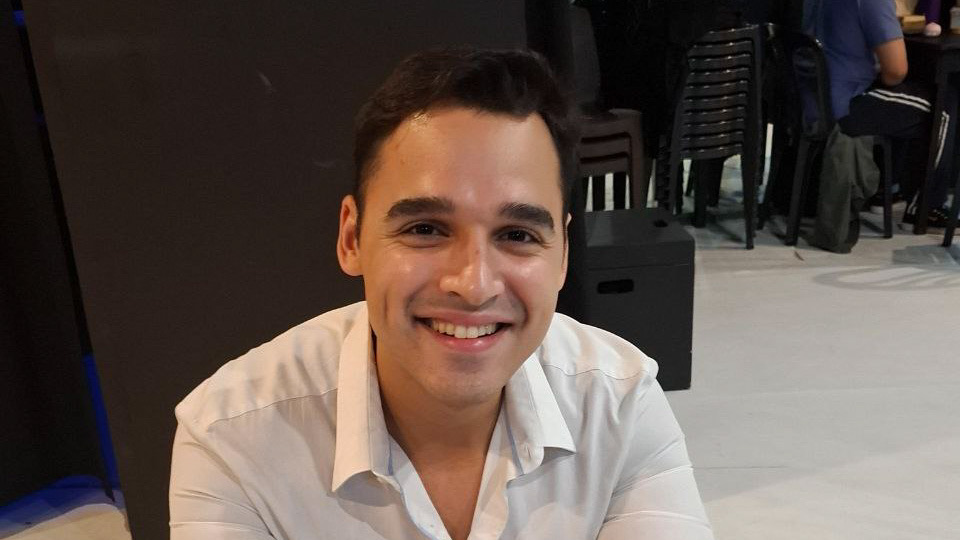
Nelsito Gomez Takes On the Bard
We talk to Nelsito Gomez about his penchant for the classics, self-education, and why Shakespeare may or may not be intimidating.
Nelsito Gomez has done it all. From being a MYX VJ to writing, singing and dancing in a music video, from acting in both musicals and existentially heavy plays, to directing operas and making classics fresh again. It seems there’s nothing this thirty-four year old jack-of-all-trades can’t do.
Having made a name for himself as a “Quintosian” actor, he was last seen onstage as Father Angel de Blas in the late Floy Quintos’ last play, Grace, which just closed its second run in Areté, Ateneo. Apart from being the Artistic Director of C.A.S.T. PH, he has also directed operas, most recently an intimate La Bohème for Viva Voce, as well as plays for MinTeatro (Saint Joan and Hamlet) and an all female cast for A Midsummer Night’s Dream for the Playbook Club. Nel also passes on his knowledge as Head Workshop Facilitator for the Atlantis Musical Theatre Workshops, and teaches Theater Arts in MINT College. Last year, he adapted Chekhov’s Uncle Vanya to feature a female protagonist in Uncle Jane.
TheaterFansManila.com interviewed the director/producer before a rehearsal of CAST PH’s Othello of which he is director as well as playing the role of Montano.
You started out as an actor before getting into directing. Can you tell us more about your path from being a VJ host then a recording artist, and then later, on directing?
My father is a musician. In fact, he is part of a Latin duo from Colombia. My dad and uncle were straight up gypsies, on their own at a very early age, and they played music. My uncle went to Spain and got my father to go with him. They’re huge in Spain. Elkin and Nelson. Their albums still get played over there. In the late 80’s they came over here to cut a record, because it was cheaper to cut records in the Philippines. He met my mom, the rest is history. So music has definitely been ingrained in my system since even before I was conceived.
When I was born, I was very much exposed to live entertainment constantly. I was 12 years old and I was going to bars because my mom managed a band. I was always in the presence of musicians and music, nonstop. So if there’s anything I knew I wanted to do, it was to create an evening in which people can enjoy. Any decision I made from then on in my life always revolved around that. I loved just creating some kind of event, performance, whatever that people can come together and have a good time.
That was how it sprang. Theater workshops when I was younger, then when I was older, I tried DJ-ing, and then performing in a boy band, and attempting my really unsuccessful pop career, then landing my butt back in theater, where I feel I belong. So it always revolved around an evening where people can come and share. Anything live. Anything I did in the past connected around that, creating a moment where we can all take part in and enjoy, and have a good time.
You wear many hats such as actor, director, host, and teacher. How would you say those different hats feed into each other?
Control. (laughs)
I think it goes back to control. When you’re a host, you’re basically the master of ceremonies, so you’re in control of the pace of the program. When you’re a director, you’re in charge of the overall production. When you’re an actor, you’re in charge of your role and where it needs to go. When you’re a VJ, you have a semblance of control.
I always felt most comfortable when I was in charge of something, guiding people somewhere. That’s how they feed into each other. When you’re a host, you put yourself out there as yourself; when you’re an actor, you put yourself out there as your role.
When you’re a director, you take a back seat, but I learned different ways of talking to people, especially when collaborating not just with actors but also with lighting designers, composers, and others. Dipping my toe into many different pools has given me the vocabulary to communicate better with different kinds of people.
Your recent oeuvre as a director leans to the heavy-weights. Shakespeare, Shaw, and Chekhov. What criteria do you look for, when choosing a play to direct?
It’s gotta speak to me. It’s gotta be something in the play that I feel is important to share. If it speaks to me, then hopefully I’ll be able to harness that, so it speaks to other people.
When I did Saint Joan, it didn’t initially speak to me at the beginning. In fact, the choice of the show was the students’, not me. But when I actually had to go and study it, I realized, ‘My god, this is fantastic!’ This is a woman ahead of her time, who was criticized and prevented from reaching the heights she could have reached. I thought it was wonderful.
In this fast-paced, advanced world that we live in, most of our problems have become insular—focused on things like Facebook likes and connectivity. I’m of an older school, I guess, where I prefer my problems to be more existential. I love stories that pit a person against where they stand in the universe. That is always a big theme for me. That was Saint Joan, that was Hamlet, and even, to some degree, Chekhov, in a very small and intimate way. It’s all about: ‘Where do I stand in this world? What do I have to offer it? What does it have to offer me? And what is the point of it all?’ Those questions really attract me every time I come across plays like that. That’s why it’s no secret that I tend to gravitate towards older plays, because they grapple with those kinds of questions.
I’m obsessed with anachronism. I love seeing an old play through a new lens. That’s why all my productions are modern dress, more often than not. I never do period dress because I feel that’s one way of taking an old work and giving it a new dress, a new energy.
Even Othello is in modern dress. There’s something so beautifully theatrical about anachronism—you know what you’re hearing is old text, because no one talks like that anymore, but what you see is contemporary. The fact that those two elements can play in your imagination, that’s what theater is all about.
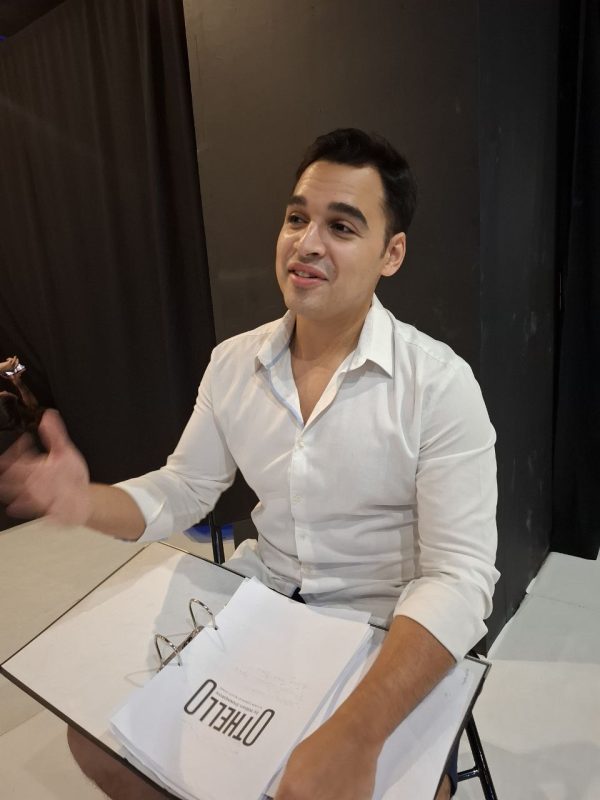
Nelsito Gomez directs Othello
Tell us how your interest in Shakespeare developed.
The first time I was introduced to Shakespeare, I was cast in a production of Romeo and Juliet in 2015 opposite Rachel Coates. I was 25 at the time and had no idea about Shakespeare.
I never went to college. I’m what they call ‘prep to pro’, where it’s high school and I jumped right into the professional world. I was 17 in High School Musical. I never got to study these things. I never got to study in depth Greek literature or other kinds of literature. In my 20’s, I was playing catch up most of the time. I’m just very lucky that I landed with a wonderful, wonderful director, Jaime del Mundo, who really just took a chance on me when I guess nobody else was. I was known at that time in theater as the guy who would take off his shirt in the show.
When I was 23, 24, I was absolutely that guy, with absolutely no depth whatsoever. But you know, he took me under his wing. And little by little, these classics like Shakespeare, Chekhov, Ibsen–at the beginning it’s hard. But as long as you persevere, and continue studying them, little by little they’ll start making sense to you, and that’s what led me to my love for opera as well. It’s hard at the beginning. You can’t decipher all these instruments all playing at once, but you just have to keep at it. Give it a chance every day. And then when you crack the code, it’s the most beautiful, satisfying experience in the world.
I don’t know if it had anything to do with not having a college education and my self-drive to self-educate. Maybe I have this weird chip on my shoulder. Even if I didn’t go to college, I’m gonna break these classics, I’m gonna really get into them and not feel intimidated by them. We live in a world where everything is so easy. Everything is at your fingertips. So to delve into things that are hard, I think is so satisfying because those are the ones that are worth it.
I would only delve into harder material before when I had to do it. But Romeo and Juliet was the one that opened the floodgates. And it was around that time that I first discovered an Othello production that I absolutely fell in love with: The National Theatre version. Rory Kinnear and Adrian Lester, 2013, directed by Nicholas Hytner.
It was sexy, it was provocative, it was moving, it was disturbing, it was current and modern, and absolutely blew my mind. And at the time, at 23, I didn’t know that Shakespeare could be done that way. They speak an older language, and yet they look so current and contemporary. I said, oh god, I need to do more of that stuff. I technically saw a Merry Wives of Windsor before, but I didn’t get it at the time. I don’t think I was ready yet. But Othello was the one that cracked the code.
In the Philippines, Shakespeare is still viewed by many as either intimidating or even irrelevant. Why produce his plays?
Because he is both not intimidating and absolutely not irrelevant. I didn’t go to college. There are so many people smarter than me. And yet Shakespeare speaks to me because I made an effort. And there’s nothing wrong with coming to the theater and making an effort. It can’t be always easy.
I’m not saying that the other kinds of shows are just easy and instantly palatable. I don’t disagree with that kind. If that’s what you want to do, great. But people have to understand that when you come to the theater, it can’t just be entertainment for entertainment’s sake anymore. It could be entertaining, but you need to be challenged. And there needs to be an effort from the audience. It can’t just be, ‘I’ll sit back and I’m just gonna let this come to me.’ No. You gotta work with the piece as well, because that is, for me, the most satisfying viewing at the end. That’s the life affirming part.
There’s nothing wrong with things being intimidating at the beginning. ‘Intimidating’ is just a word for us to self-protect, for self-preservation. ‘Oh this is intimidating, I’m going to avoid it.’ But if you meet it halfway, you can break through that intimidation, and more often than not, the things that intimidate you are things that are worth investing in.
Everyone knows that Shakespeare is the most performed playwright in the world. There’s a reason why that is–because his stories are absolutely universal. Sadly they are still relevant to this day, and that’s how you know that the world is not progressing. We still have–especially in the theme of Othello– spousal abuse, racism, jealousy, all these things still exist in our culture. And I pray for a day that Othello will be rendered irrelevant, when its themes don’t matter anymore to our world. Unfortunately, they still do. And that’s why stuff like Shakespeare still needs to be done.
Other plays can talk about the same themes, but the beauty of Shakespeare is that it’s not so much for the plot, it’s for the language that he exposes the plot. I think Shakespeare is a valuable teacher. You can totally sum up the plot of Othello in four emojis–guy, girl, stab, blood–but the beauty of Shakespeare is, he explores every color of jealousy, every color of love, every color of envy, of murder, feelings of passion, of hatred. You get all the gradations. It slows time down to really examine just the feeling, but you see all the colors of that feeling.
That’s why Shakespeare is unlike any other. He takes the time. In any Shakespeare play, you can totally cut through all the soliloquies. They’re time-stops. They’re like arias. They don’t move the plot forward. It’s a moment where we explore the feeling of whoever it is. We can cut through it all, you can cut through all the Hamlet soliloquies, but the fact that he takes the time to explore what it means to live or die, that’s why you end up with one of the most famous speeches in the whole world.
What do you think Filipino artists bring to Shakespeare that is different from, say, if it’s performed by English actors, or American actors, etc.?
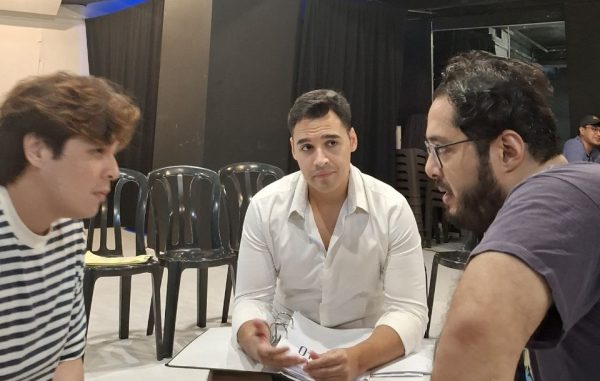
L-R: Reb Atadero as Iago, Nelsito Gomez directs Othello, Tarek El Tayech as Othello; Photo Credit: Sarah Facuri
Heart and instinct. It’s not an unknown thing that we Filipinos wear our hearts on our sleeves. So a lot of Filipino actors really go on wonderful, wonderful instinct. It’s so wonderful to play with Shakespeare especially. There’s also a tendency for people to get so caught up in the words that they emotionally hold back. Shakespeare’s words are there for you to unleash your feelings/emotions, just like a good song does.
I love collaborating with very instinctual actors. Do we have to kind of break-in the muscle of Shakespeare? Absolutely. Do we have to get into certain training to kind of say the lines, what to highlight, the rhythm? I don’t really obsess too much with the iambic pentameter because it’s already built into us as humans, because it’s related to the rhythm of your heart.
Most of the people I get are from musicals, so they’re musical already. They get the music of Shakespeare. It’s just a matter of giving them the tools with which they can access the language. But once they do, the feeling absolutely just comes naturally, as a Filipino artist is. And that’s what I keep reminding my actors: our challenge is to always kind of walk this tightrope of clarity of text, and truth of feeling. Like any great opera singer, you don’t want to just hear vocal calisthenics. But also, you want to hear beautiful sound, beautiful artistry.
To ride that line between emotional truth, and skill, and craftsmanship when it comes into the language, into taking care of the language, that’s the challenge for any artist. I think an artist that can balance both is amazing. I love instinctual actors, and then we follow up with the discipline. I think that’s what the Filipino actor offers Shakespeare: this kind of blood-and-guts attack on the text, not too cerebral and all that.
Some of the actors in Othello are doing Shakespeare for the first time. What made you choose them?
I’m such a fan of all the wonderful theater actors here, and I just get so kilig at the idea of making them do these big parts. The world standard is Hamlet, the world standard is King Lear, Uncle Vanya, or Arkadina, or Dr. Stockmann. It’s these classical roles that the world recognizes almost as a litmus test for your skill as an actor. I love that. When I see a lot of the actors here, who I’m such a tremendous fan of, they haven’t really done roles like that, have not matched their unique gifts with those parts that the world has deemed as these big parts.
With Missy Maramara in Uncle Vanya, I wanted to see a female Uncle Vanya. I wanted to see Topper Fabregas do Dr. Michael. And then here also, I’ve been dying to see Tarek El Tayech do Othello. For me, he’s the only one to encapsulate in his actor’s voice and body the roaring rage as well as the aching vulnerability of Othello. I’ve been dying to see Reb Atadero do some Shakespeare, because he’s so incredibly gifted and musical, and I think he can totally tap into the rhythm of Iago. And then, you know, Iago is a bit of a shape-shifter as well, which is obviously Reb’s gift. He is kind of chameleon-like. I’ve always wanted to see Gab Pangilinan do a classical part as well. Maronne Cruz, too.
A lot of this stems from the fact that I’m such a fan of these guys: (I want) to see their skills go up against the greats. And it doesn’t always have to be me directing them or producing it, but if I could help them connect with it and unlock something, then great. If it’s somebody else, I’m going to be one of the first to watch that show.
Othello is known to be very controversial especially with racism as an important theme in the story. With that in mind, how is it relevant to our Filipino society / Manila audiences?
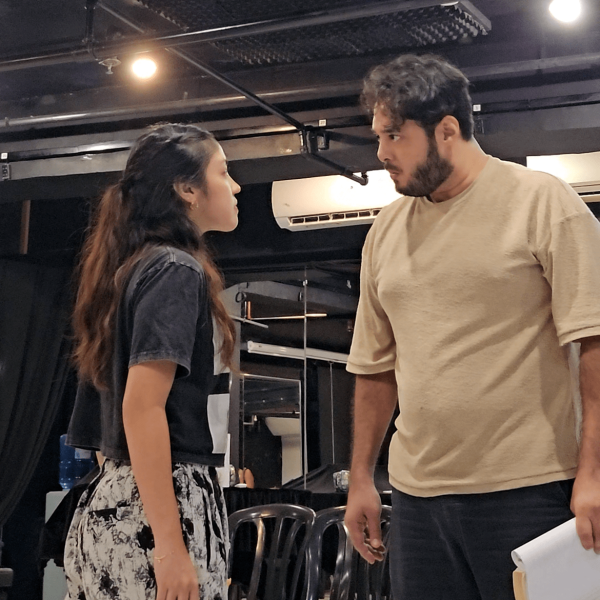
Gab Pangilinan as Desdemona and Tarek El Tayech as Othello; Screenshot from video
That’s so funny. I think racism is one aspect of Othello, and definitely, many productions have zoned in on it and expanded it, most recently the new National Theatre production. It’s definitely very racially driven, I think, also because the director is African-American as well.
But I do feel–this is just me–that if we hone in on just that one thing, we lose all the wonderful colors of the rest of the show. Racism is absolutely part of it, but there’s also toxic masculinity—the reason why men don’t talk. The whole drama of Othello could have been solved if Othello, at the beginning, told Desdemona, ‘Hey, did you give my handkerchief away?’ And then that would have been done. But no, he asks, and Desdemona asks in the last moment, before she gets strangled, ‘What’s the matter?’ That’s the only time they discuss something close to it. Because men don’t talk about such things. Men would assume automatically that they’ll be cuckolded. And they can’t confront their wives and just talk about it. It’s a very masculine thing. Growing up in LSGH and a very toxic masculine world, that really spoke to me.
Then there’s the psychology of jealousy, because for all intents and purposes, what Iago does in the play is sparked by the belief that Othello slept with Iago’s wife. So he has insecurities about his sexual impotency, and then you have violence against women as a strong theme, which is very essential in our production as well. Unfortunately, to this day, spousal abuse is still a health crisis. Racism is definitely one aspect. I cannot say that in our production it is expanded much, though Tarek is half Filipino, half Arab. So technically, when we say “The Moor,” there is legitimacy in what we’re saying, and he looks different from everyone on stage—absolutely. But it’s not too honed in on; we try to highlight the other, more psychological aspects of the play in terms of jealousy and abuse.
You have sometimes taken certain liberties with the texts of plays you direct. Can you tell us more about that?
When I’m working with everybody in Othello, we tackle the text and if there’s a bit of the text that doesn’t make sense to us–cut! Iago has a line when Othello doesn’t listen to the generals and he appoints Cassio as a lieutenant, right? The actual line there is “nonsuits my mediators.” Nobody is going to get “nonsuits.” So we changed it to “denies my mediators.” We take those liberties for clarity’s sake.
Gab, in rehearsals, she brought up a piece of text from the actual one that I had cut, and she said, ‘Will you consider bringing it back? It’s a beautiful line and it sums up Desdemona really well.’ And I said, ‘Oh wow! This is a wonderful, wonderful line. Let’s not just put it back. Let’s put it at a better moment where it’s more obvious.’ So I take those liberties.
I don’t feel like these plays need us to touch them like they’re the most immaculate thing in the world, like they’re sacrosanct. No. You have to grapple with these dramas as if they were happening for the first time. And that’s what I always try to do with everything I do. It should feel like the world premiere of the play again. Now, do I get things wrong? Absolutely. I totally accept that. Do I take liberties that other people don’t like? Absolutely. I totally agree with that. But for me, I’m just always concerned with the drama in the moment, and how it’s unfolding for the audience. That’s my number one priority, and maybe not going to college and not looking at it from an academic point of view gave me this bold show of courage, but I just feel–especially with Shakespeare, and I’m very passionate about this–that we cannot leave Shakespeare just for the academics. They were never meant to be that way, it’s not supposed to be studied in a scholarly fashion. I mean, sure people can and do, and that’s great, but these are meant to be taken in, memorized, and spoken out loud in front of an audience. That’s the true fire of what Shakespeare is, always.
So for me, the way you can access Shakespeare the best is through a live performance of it or by listening to it. That’s the only way. You’ll feel the beauty of Shakespeare work its wonders on your imagination and your heart if you hear it out loud.
I have moments where I’m like, ‘I’m going to cut a bit around these soliloquies.’ It’s a balance of recognizing that my audiences are not so familiar yet with Shakespeare, of pushing them but then not giving them everything right away, because even that, for me, can then be “intimidating.” I’m gonna cut this script in the most palatable way I think you can absorb it, then work with me. The audiences we’ve been getting are definitely young professionals or college students.
Which of Shakespeare’s characters do you relate to the most, and why?
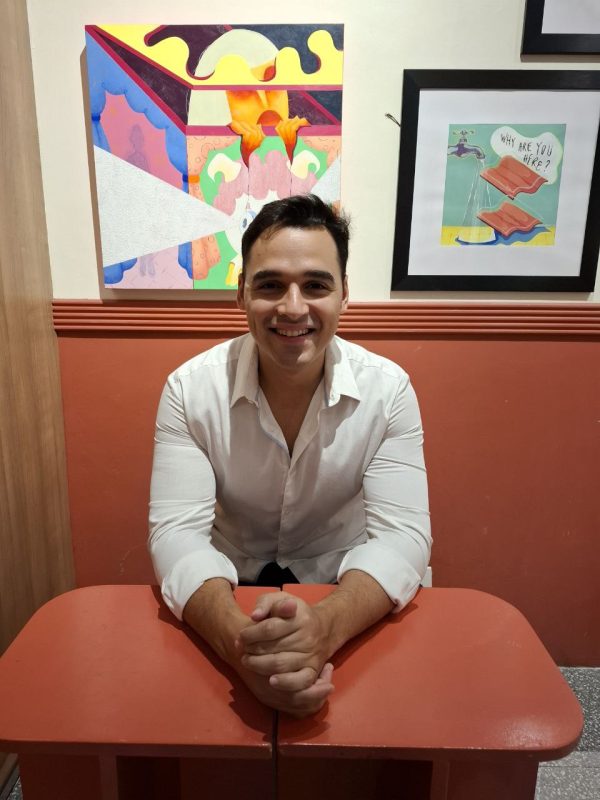
Nelsito Gomez; Photo Credit: Gabi Francisco
Henry the Fifth. Yeah, of course, the easiest answer five years ago would have been Hamlet. But I think at this point in my life, Henry V. If there’s ever a part I would be interested in playing, actually, it would be Henry V. Not even Hamlet, or even Iago.
Especially in this day and age, when I wake up every morning I’m always so conscious about who is leading us, who are the honorable leaders, and what do they have to face all the time. I live in Pasig, so I’m a humongous fan of Vico Sotto. I saw his interview recently in Rappler with JC Gotinga, and every answer he gave was so well thought of. Man of honor, practical, he doesn’t have delusions of grandeur when it comes to this blind idealism. He’s very practical (in) how he attacks every issue, every program for Pasig.
For me Henry V is always battling–I’m getting a little emotional–I think he’s always battling what it is to be a good leader, and yet, also recognizing that he is a human being. He’s got that wonderful scene where he discovers his betrayers. And he kills them. Because he has to. As a king, you can’t have that kind of mutiny in front of you, right? You have to do what you have to do. So it’s that responsibility of a leader, the good and the bad. After they win the Battle of Agincourt, he kills all the prisoners. He just won. He gave this wonderful “We few, we happy few, we band of brothers” speech. “For he who sheds his blood today shall be my brother.” All those wonderful lines. And yet after all that, and they won, he’s going to kill everybody?
For me, and especially now, when we see conflict, nonstop, of leadership, this Palestinian conflict, this presidential campaign in the United States, I’m just looking for leaders who are not immune to the vulnerabilities and temptations of being a human being in a leadership position, but choose to be better for the benefit of everybody else. I think Henry V struggles with a lot of those decisions. He’s definitely a character that I find so fascinating, that speaks to me, and maybe in one production in the future, I’d love to give him a crack.
Answers have been edited for clarity.


Comments